6 Best B2B Data Providers
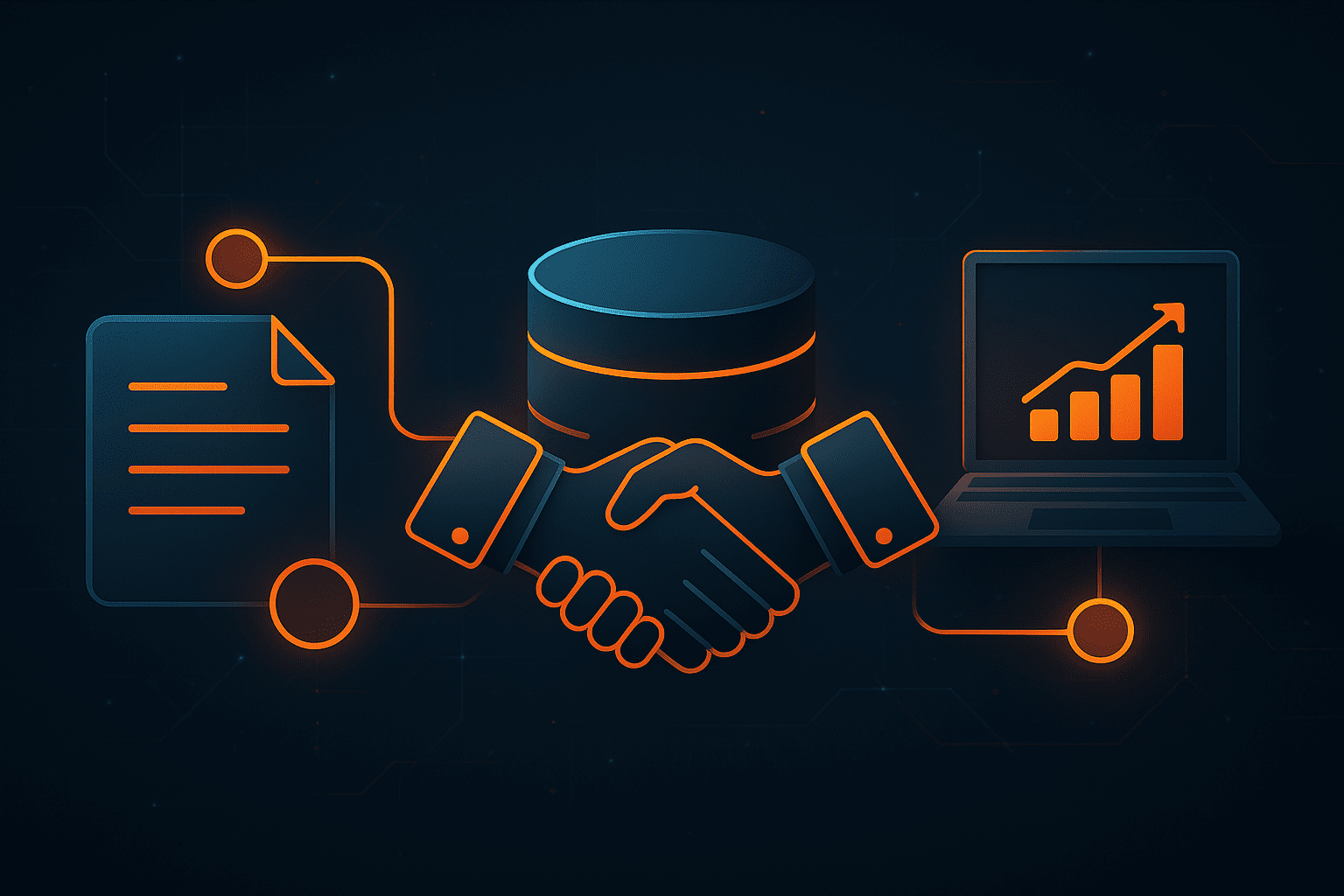

Need B2B data but not sure where to start?
We get it. There are so many data providers out there, and it can be a headache trying to figure out which one is the right fit.
Don’t worry, though, because we’ve done the digging for you.
In this article, we’re sharing six of the best B2B data providers, each offering unique strengths across different use cases, data types, pricing models, and target company sizes.
Let’s get started!
Let’s kick things off with Veridion, our own solution.
Trusted by leading teams in procurement, risk, insurance, and sustainability, Veridion is an AI-powered market intelligence platform delivering unmatched company-level data.
Our database includes:
This gives you thorough coverage of public companies, large private firms, and more than 90% of SMBs, including digital-first, unregistered, and micro-businesses often missed by traditional providers.
Plus, our data is updated weekly, ensuring you’re always working with the freshest, most reliable information.
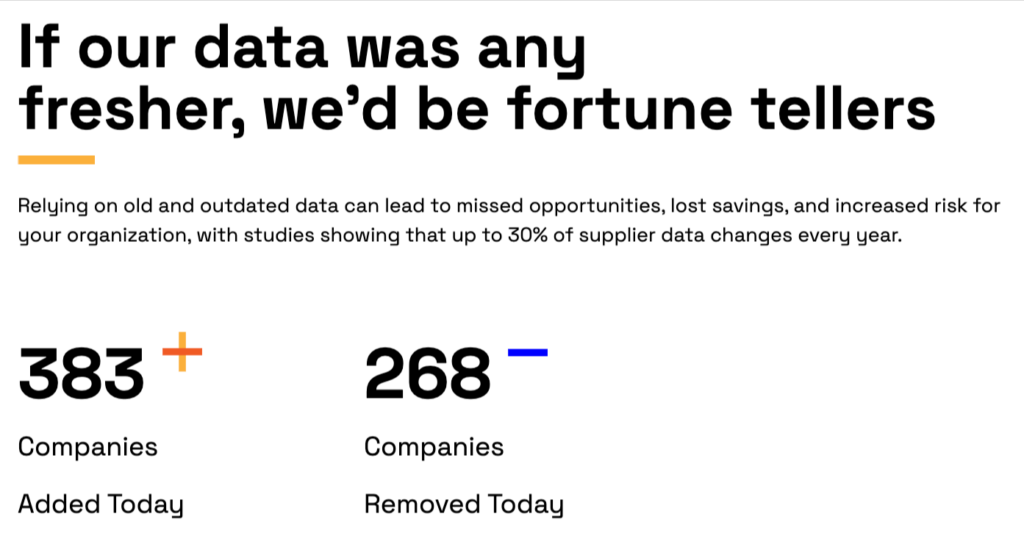
Source: Veridion
But Veridion’s data isn’t just broad.
It’s deep as well, with each company profile including far more than static firmographics.
You’ll gain access to detailed insights like ESG policies, technographic stacks, operational footprints, product data, and compliance info, enabling nuanced segmentation and more intelligent risk models.
Here’s just a portion of one data sample:
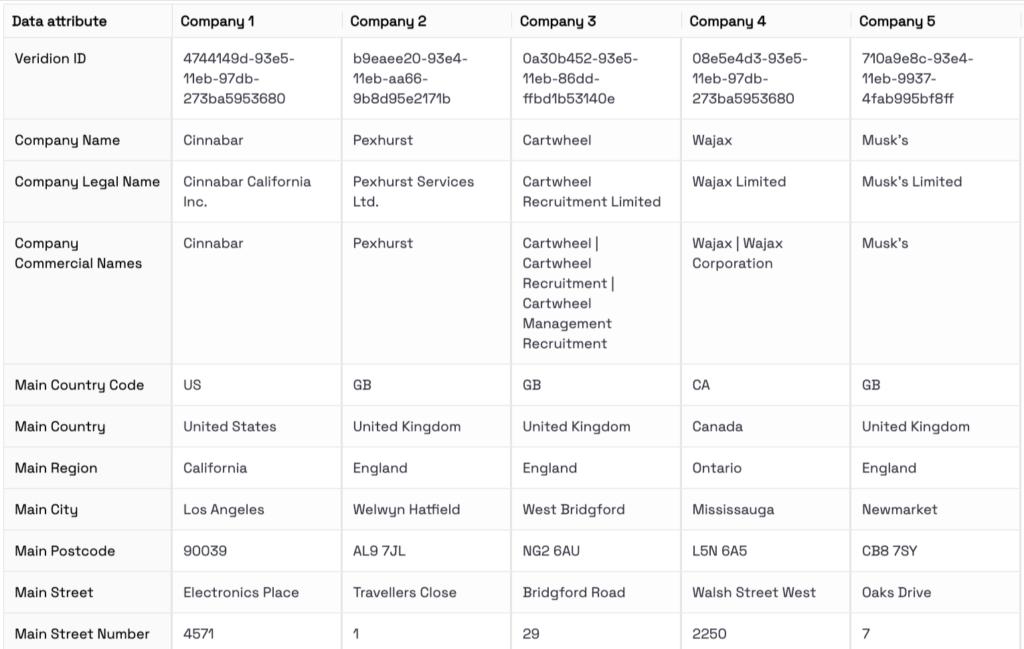
Source: Veridion
But how accurate is Veridion’s data?
Very.
It all comes down to our proprietary sourcing methodology.
We built an end-to-end data pipeline from the ground up, giving us complete control over every stage, from sourcing and extraction to normalization and delivery.
Our core data comes from first-party sources such as company websites and legal registries.
We then enhance and validate it using multiple third-party sources, including social media, news feeds, and public filings.
Learn more about it here:
Source: Veridion on YouTube
Unlike many providers, we don’t rely on external vendors.
This ensures consistency, transparency, and traceability in every dataset.
We also incorporate client feedback loops and continuous machine learning refinement, which constantly improve the accuracy and relevance of our data.
And because we control the entire pipeline, we can also control its security.
Veridion employs enterprise-grade security measures:
Our data is securely hosted in facilities across Europe and North America, fully compliant with GDPR, CCPA, and other major data privacy frameworks.
Moreover, Veridion works with any system—no overhaul required.
Our flexible delivery options allow you to integrate Veridion data directly into your existing BI tools, analytics workflows, market intelligence platforms, or internal data lakes:
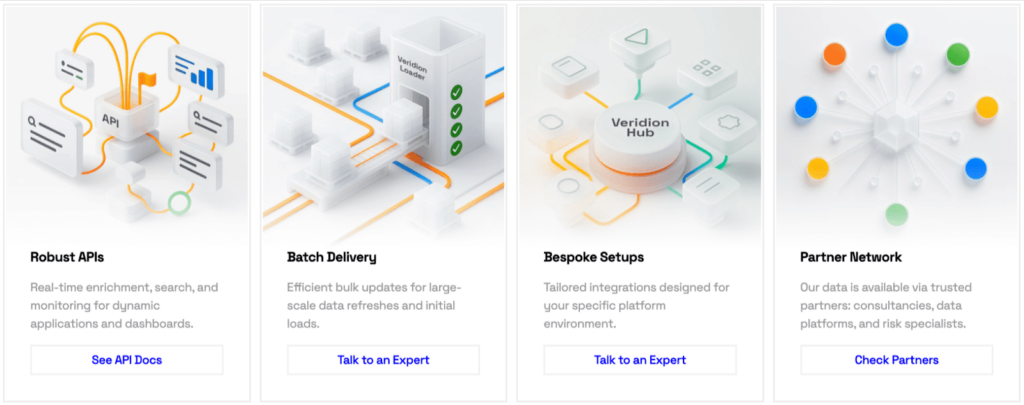
Source: Veridion
All in all, whether you’re enriching your CRM, performing detailed market or risk analysis, or streamlining procurement processes, Veridion delivers the quality and depth of data you need.
We’re driven by the complexity of AI and Machine Learning, always striving for better ways to source, structure, and extract value from data.
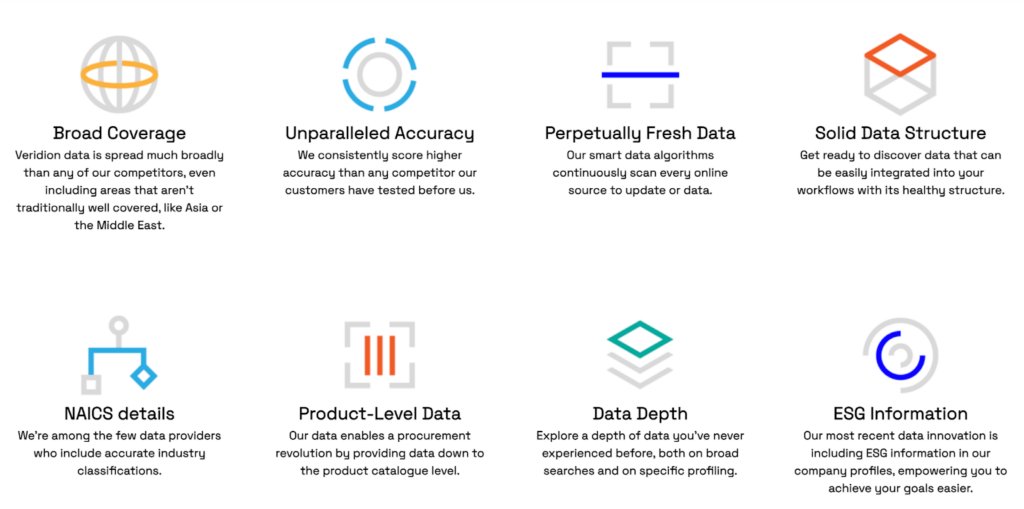
Source: Veridion
Our datasets have yet to be outperformed by the industry’s biggest names.
When it comes to accuracy, completeness, and classification, Veridion leads the pack.
Curious to see for yourself?
Visit our website to download a free sample or schedule a free data consultation to learn more.
Coresignal is a public web data provider offering fresh, large-scale datasets to global companies across industries such as investment, sales technology, HR technology, and research.
Its database spans three primary B2B data categories:
Let’s briefly break them down, starting with company data.
Coresignal provides over 113 million global company profiles, enriched with firmographic data, workforce trends, funding rounds, financials, web traffic, and more:
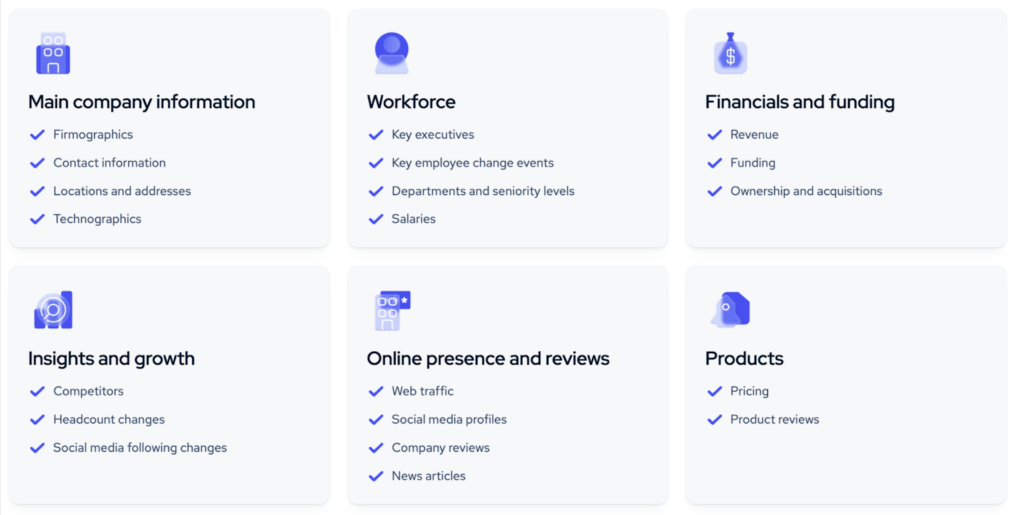
Source: Coresignal
Compared to Veridion, however, Coresignal is somewhat limited in this category.
It offers slightly fewer profiles and lacks some advanced insights like ESG data and detailed industry classifications.
So, if those are must-haves for you, you may want to look elsewhere or supplement with another source.
Now, where Coresignal truly excels is in employee and job intelligence.
It offers access to:
This makes it a go-to solution for anyone focused on talent analytics, sourcing, or mapping.
If you’re in HR tech, recruitment, talent intelligence, or labor market analysis, you’ll love what it brings to the table.
Just keep in mind that Coresignal updates its data monthly, which is a bit less frequent compared to the other solutions on this list.
It’s still solid for most use cases, but if real-time or near-real-time data is important for you, it’s something to factor in.
The platform is flexible when it comes to data delivery.
Buyers can choose from various formats, delivery methods, and update frequencies to suit their operational needs.
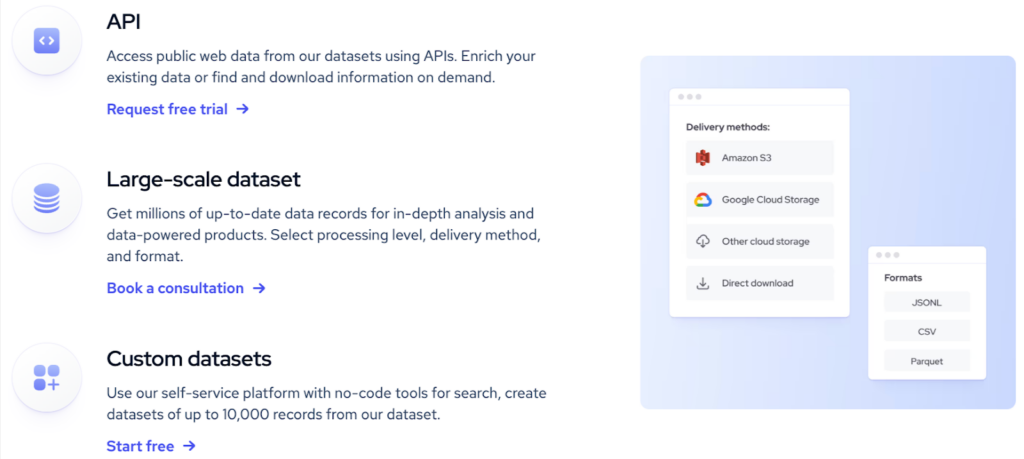
Source: Coresignal
And in terms of compliance and security, Coresignal is very dedicated to ethical data sourcing.
It ensures compliance with GDPR and CCPA, and maintains robust policies for data security, privacy, and business continuity, all of which are regularly updated.
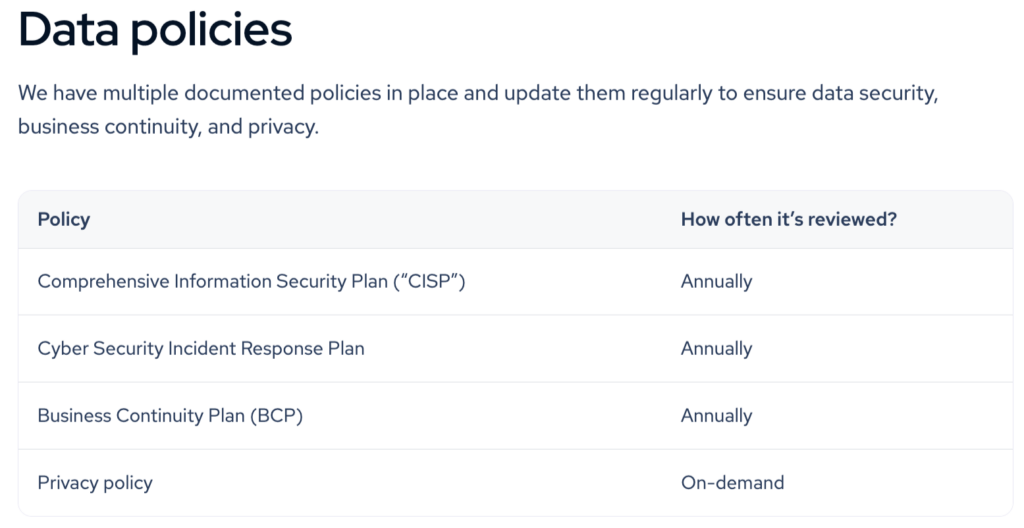
Source: Coresignal
Overall, among the solutions on this list, Coresignal stands out as a leader in employee and job data.
It’s particularly well-suited for applications in talent sourcing, recruitment, talent intelligence, sales prospecting, and investment research.
So, if you’re interested, consider scheduling a free consultation or taking advantage of Coresignal’s 14-day free trial.
If you’re a small or growing business looking to streamline your sales outreach, Apollo.io could be exactly what you need.
It’s an all-in-one sales intelligence and engagement platform that combines a massive B2B contact database with tools for email automation, calling, and CRM integration.
With Apollo, everything you need to find, engage, and convert leads is in one place.
But let’s talk data.
Apollo offers access to over 210 million contacts and 35 million companies, helping you connect with potential customers across the globe.
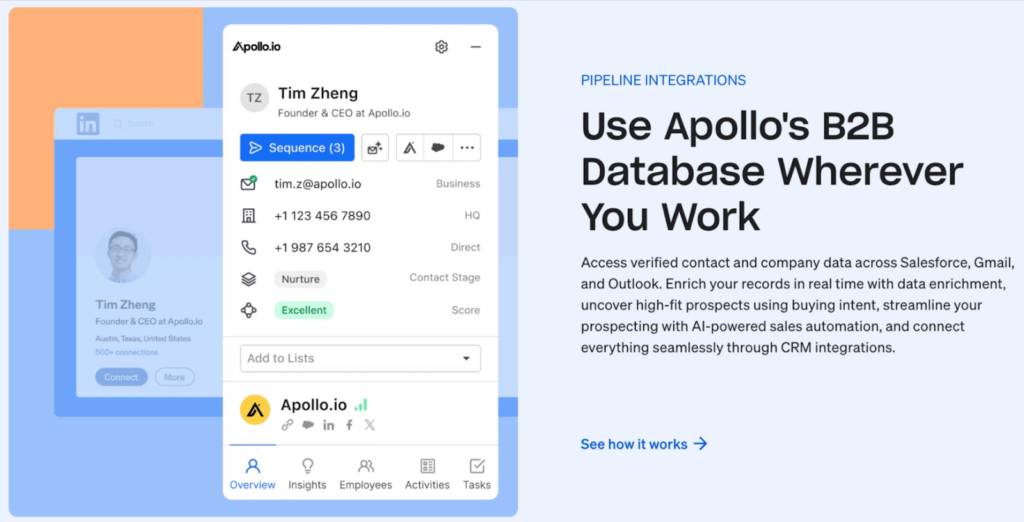
Source: Apollo.io
Plus, its 65+ advanced search filters let you include or exclude specific criteria to precisely target your ideal prospects:
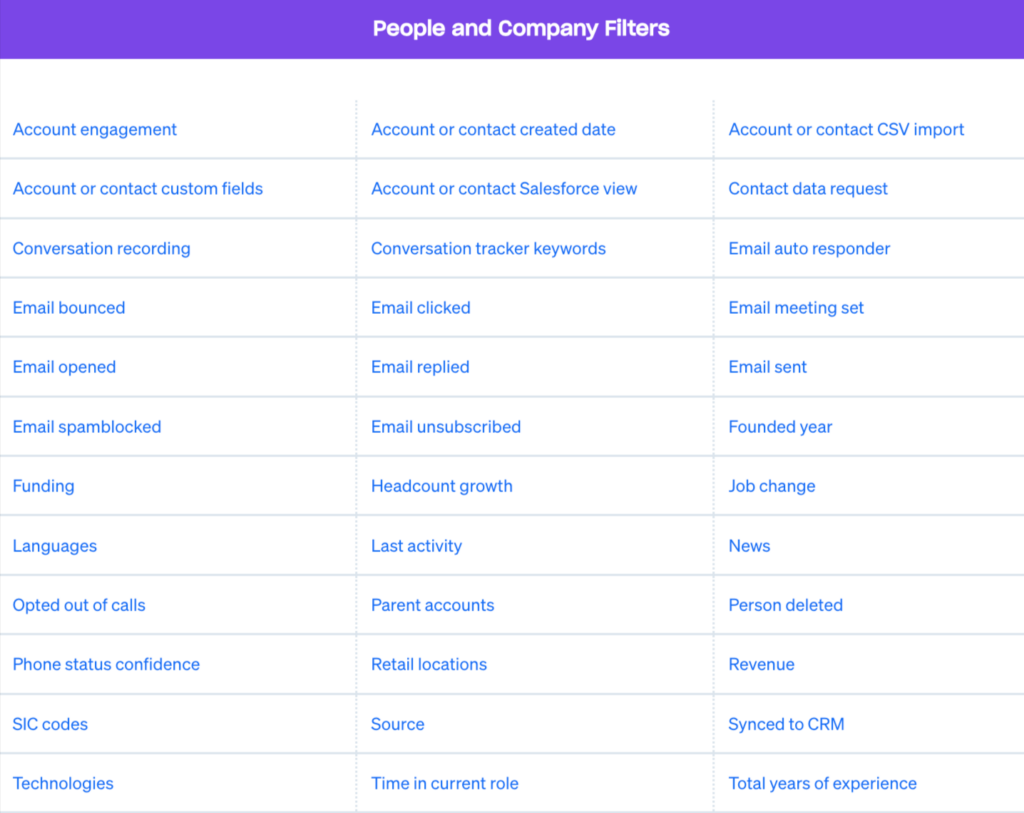
Source: Apollo.io
In terms of company-level data, platforms like Veridion or Coresignal outperform Apollo, offering more detailed and granular company profiles.
That said, Apollo delivers excellent contact data for outreach-driven workflows.
Its profiles are rich, accurate, and actionable—perfect for finding best-fit prospects fast.
So, how does Apollo collect its data?
It comes from four main sources:
| Contributor Network | Over 2 million users share business contact information while using Apollo’s services. |
| Engagement Suite | Email replies and bounces help validate addresses, continuously improving data accuracy. |
| Web Crawling | Proprietary algorithms crawl public-facing websites to gather and index business data at scale. |
| Third-Party Providers | Apollo processes over 200 million records monthly from vetted data partners. |
Unlike solutions like Veridion, which owns and controls its entire data pipeline, Apollo relies on a hybrid approach.
The upside? The massive scale that makes Apollo so powerful for outreach.
The tradeoff? A higher chance of noise and errors from user-contributed data.
When it comes to data freshness, Apollo beats many other solutions on this list with real-time updates triggered by data signals like job changes or new contact details.
It also performs monthly checks to maintain data accuracy and reliability.
Data compliance and security are also a high priority:
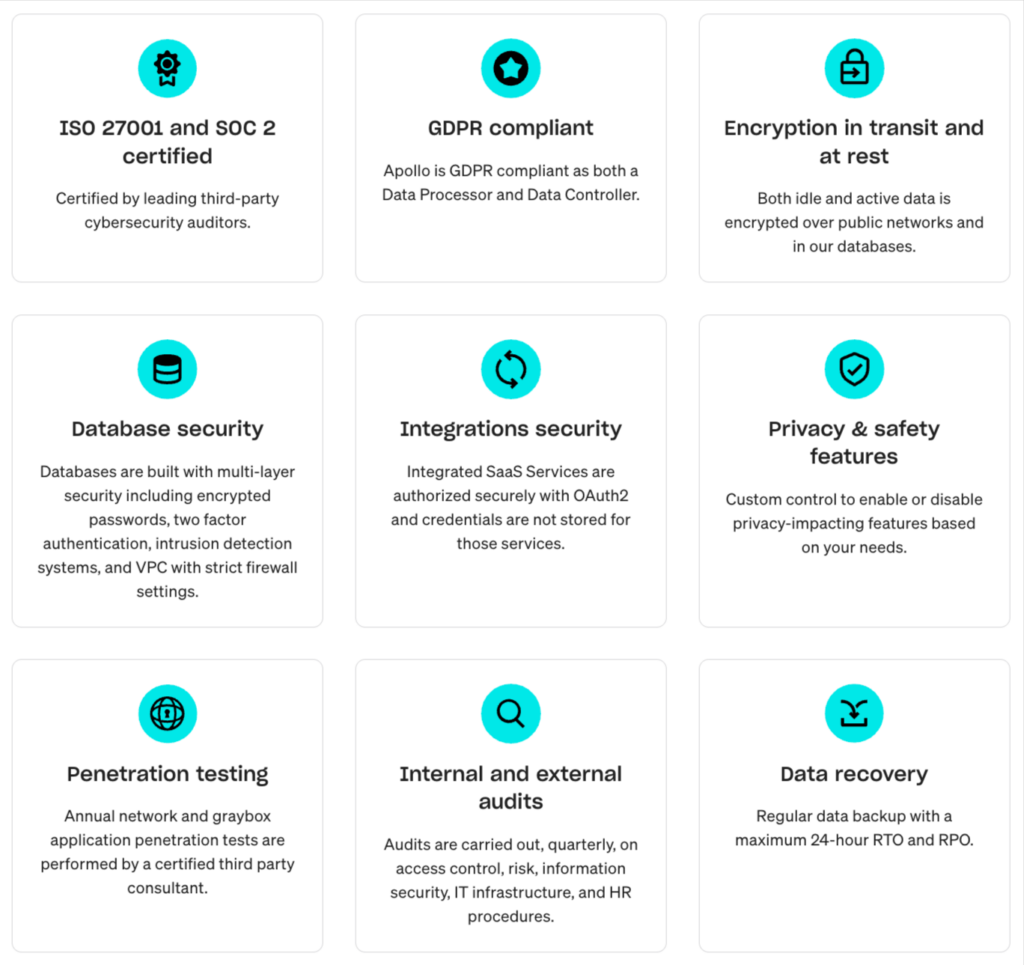
Source: Apollo.io
So, here’s the final verdict.
Apollo.io is a good choice for startups and small to mid-sized teams looking for a comprehensive sales platform.
You can discover top prospects, reach out via automated sequences, book meetings, and close deals—all within one ecosystem.
And with a free forever plan, it’s easy to get started without stretching your budget.
ZoomInfo is a well-known B2B software and data company that provides a thorough database of company and contact information to support sales, marketing, and recruiting efforts.
It works as a go-to-market (GTM) intelligence platform, equipping its users with tools and insights to identify, target, and engage ideal prospects.
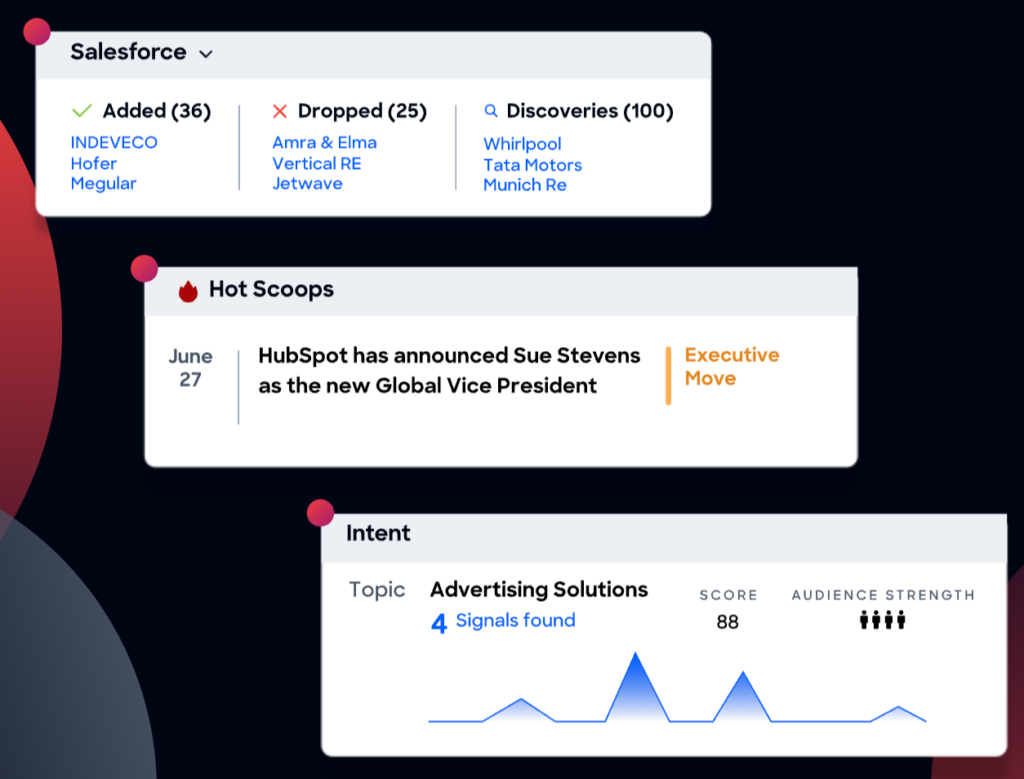
Source: ZoomInfo
it’s one of the largest B2B databases on the market.
Just keep in mind that, though it is gradually expanding into Europe and other global regions, most of this data is still focused on North America.
If you’re looking for broader international coverage, Veridion, Apollo, or Coresignal might be a better option.
That said, ZoomInfo profiles are quite rich, offering:
This Reddit user, claiming to be a ZoomInfo employee, shares a helpful breakdown of the product’s strengths and limitations:
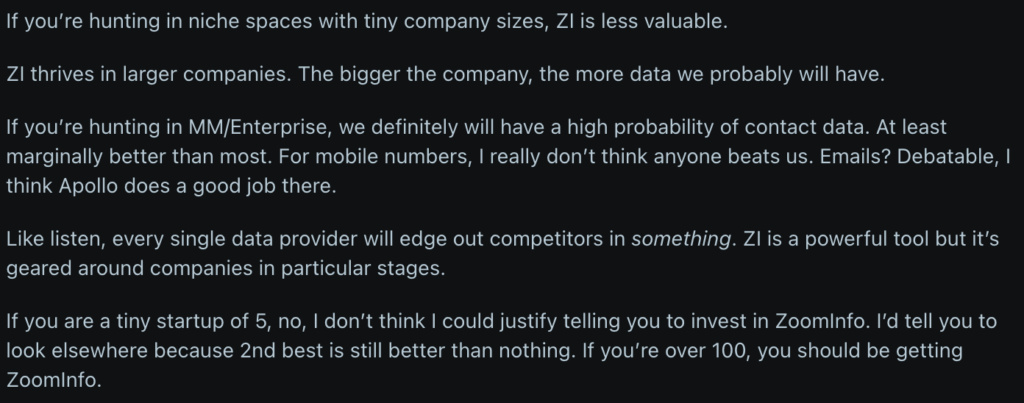
Source: Reddit
Essentially, it thrives in large, US-based companies, particularly when it comes to phone numbers.
For smaller, niche organizations, some other solutions from this list might be a better fit.
Similar to Apollo, ZoomInfo uses a hybrid approach to aggregate business data.
It relies on advanced web-scraping technologies, niche third-party sources, community contributions, and a dedicated in-house research team.
Their data is updated daily, with strict adherence to global privacy laws including CCPA (U.S.) and GDPR (EU).
So, who is ZoomInfo best for?
Considering many sources report it’s on the pricier side, this solution is best suited for large, US-based sales teams that require rich intent data, org charts, and deep CRM integrations.
If you fit this description, consider testing the waters with their free trial before making any final decisions.
While ZoomInfo dominates the U.S. market, Kaspr has established itself as a leading B2B sales intelligence provider in European markets.
Compared to some other tools on this list, it might not be the heavyweight in company-level intelligence, but when it comes to contact data, it delivers.
Its database spans over 200 million profiles, 500 million+ verified and compliant phone numbers and email addresses, and data on 50,000+ companies.
Kaspr operates primarily as a Chrome extension, integrating seamlessly with LinkedIn and Sales Navigator.
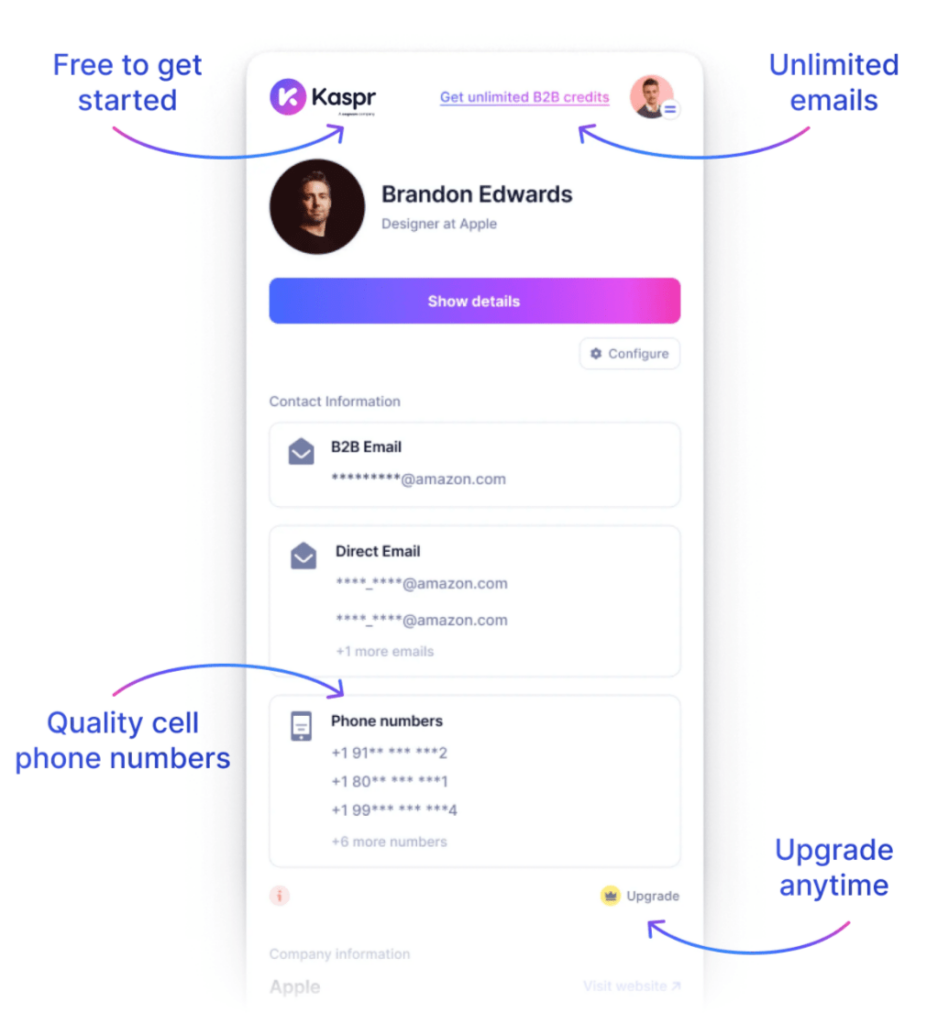
Source: Kaspr
As such, it enables users to gather contact data during prospecting and send it directly to their CRM or sales tools, without leaving their filtered search view.
When compared to platforms like ZoomInfo, both share a strong emphasis on contact data.
However, their use cases are different.
Kaspr data is optimized for LinkedIn prospecting, especially for SMBs, recruiters, and individual contributors, offering affordable pricing and a user-friendly Chrome extension.
ZoomInfo, in contrast, is a more complex solution, offering more advanced company intelligence and workflow automation.
This makes it a favorite among larger organizations.
Kaspr’s contact data is sourced through:
To ensure data freshness and accuracy, they update data in real-time, every time a user requests data.
Plus, email addresses go through a multi-step verification process to ensure they’re active and valid.
The platform is fully compliant with GDPR and CCPA regulations.
Ultimately, Kaspr is best suited for SMBs and professionals looking for fresh, verified European contact data.
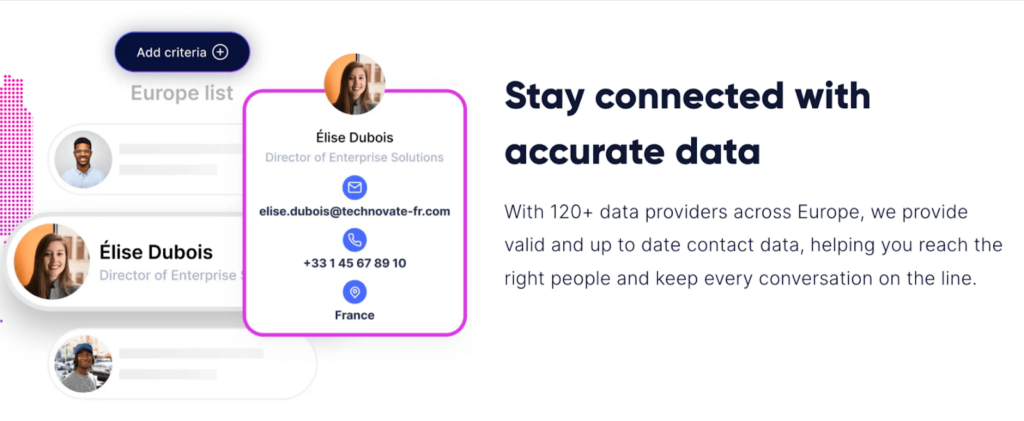
Source: Kaspr
It’s a simpler alternative to platforms like ZoomInfo or Apollo, with instant access to contact information while prospecting on LinkedIn.
Its completely free plan, which includes unlimited email access, also makes it one of the most budget-friendly options on this list.
If you’re looking for sales intelligence focused on European markets—but need something more advanced and better suited for larger teams—Cognism could be the ideal solution.
Their database includes 400 million contacts, outperforming the others on this list.
Beyond just phone numbers and email addresses, Cognism provides a rich array of data points, including:
| Funding Alerts | Stay informed about funding rounds and acquisitions to identify companies ready to invest in new technologies. |
| Technographics | Access a database of over 20,000 technologies to discover what tools your prospects are currently using and anticipate renewal cycles. |
| M&A Alerts | Get deeper insights into key company transactions involving mergers, acquisitions, or asset consolidations to better understand your target audience. |
| Intent Data | Identify who’s showing interest, what they’re interested in, and when, using intent signals that help you tailor outreach and meet prospects at the right moment. |
| Hiring Trends | Track job changes, team expansions, and executive hires to target companies actively building teams aligned with your solution. |
What sets Cognism apart is its compliance-first approach.
Backed by GDPR, CCPA, and SOC 2 standards, it’s the only sales intelligence platform that cross-references contact data with Do Not Call lists across 13 countries.
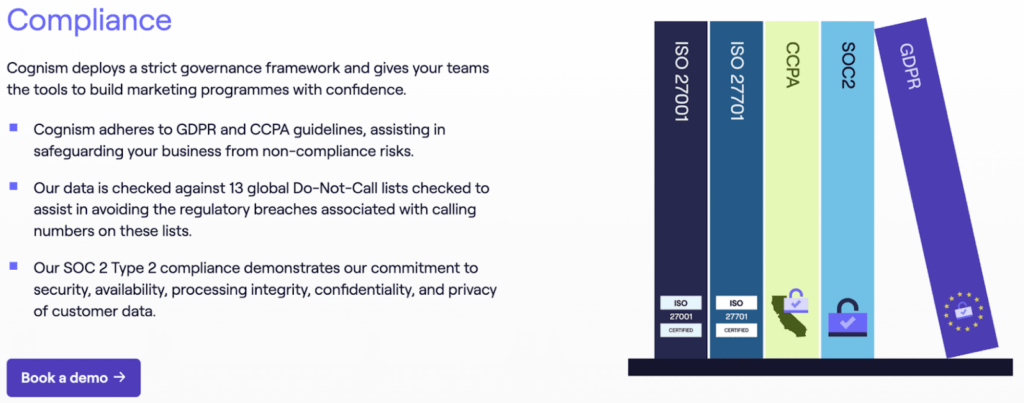
Source: Cognism
Like Veridion, Cognism doesn’t depend on third parties or contributor networks for data.
Instead, it uses its proprietary data collection engine, Orion, which sources information from across the internet, including news articles, press releases, and more.

Source: Cognism
Each company profile is built from 60–200 unique data points, then filtered through multiple layers of verification, and the data is refreshed daily.
This solution is best suited for larger enterprises, particularly teams in Sales, Marketing, RevOps, and GTMOps focused on driving revenue growth in Europe.
It’s especially valuable if compliance is a top priority and your organization requires approval from your legal team for the tools you use.
However, if you’re looking for a more budget-friendly option and don’t need any bespoke legal review, this solution might turn out to be too complex and pricey.
Visit their website to learn more or book a free demo to see Cognism in action.
In the end, no single data provider does it all.
Some shine when it comes to company profiles, others are unbeatable at contact data.
A few are built for marketing, sales, and recruiting, while others cater to procurement, risk, and sustainability teams.
Regardless of your needs, ensure you test the platforms yourself or request a data sample before making any final decisions.
Check out online reviews, too. A little research goes a long way.